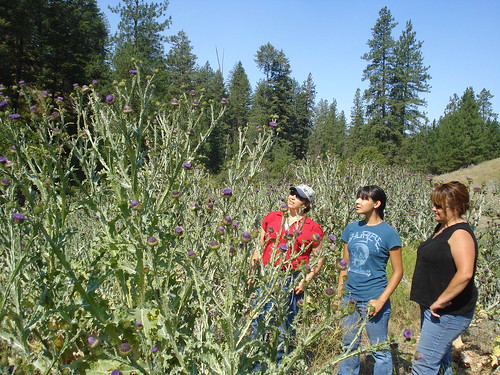
Helping American Indians develop profitable farming and ranching businesses, engaging tribal youth in 4-H, enhancing natural resources on reservations, and reaching out to tribal communities about topics that are of interest to them are just some of the activities supported by the Federally-Recognized Tribes Extension Program (FRTEP). FRTEP is administered by USDA's National Institute of Food and Agriculture and conducts education programs on Indian reservations and Tribal jurisdictions through partnerships with the 1862 Land-Grant institutions. FRTEP extension agents serve as liaisons between the Tribes and USDA programs and services. The purpose of the FRTEP program is to support extension agents who establish extension education programs on the Indian Reservations and Tribal jurisdictions of Federally-Recognized Tribes. Program priorities reflect the following areas: 1) Development of sustainable energy; 2) Increased global food security; 3) Adaptation /mitigation of agriculture and natural resources to global climate change; 4) Reduction of childhood and adolescent obesity; and 5) Improved food safety.
Later this month, FRTEP agents will meet in Fort Collins, Colorado, to receive an overview of USDA’s Animal and Plant Health Inspection Service (APHIS), its programs, and expertise. APHIS is a multi-faceted Agency that is responsible for protecting U.S. animal and plant health, and animal welfare.
“This is the first time tribal extension agents will receive such an in-depth and tailored overview of what APHIS has to offer,” states workshop coordinator and APHIS’ Plant Health Tribal Liaison Carl Etsitty. “The 2-day workshop will highlight APHIS issues and services of interest to the tribes, such as grasshopper control, animal disease traceability, and wildlife management. It will also include tours of the USDA’s National Center for Genetic Resources Preservation and the National Wildlife Research Center.”
Prior to the workshop, approximately 30 FRTEP extension agents representing 45 tribal communities were queried to find out the issues of concern for their Tribes, current extension activities, and potential APHIS-related topics. Twenty agents and tribal representatives are scheduled to attend the February 25-26 event. The free workshop is hosted by APHIS and the Wisconsin Tribal Conservation Advisory Council.
To learn more, please contact Carl Etsitty at the APHIS Office of the National Tribal Liaison, (970) 494-7573.



